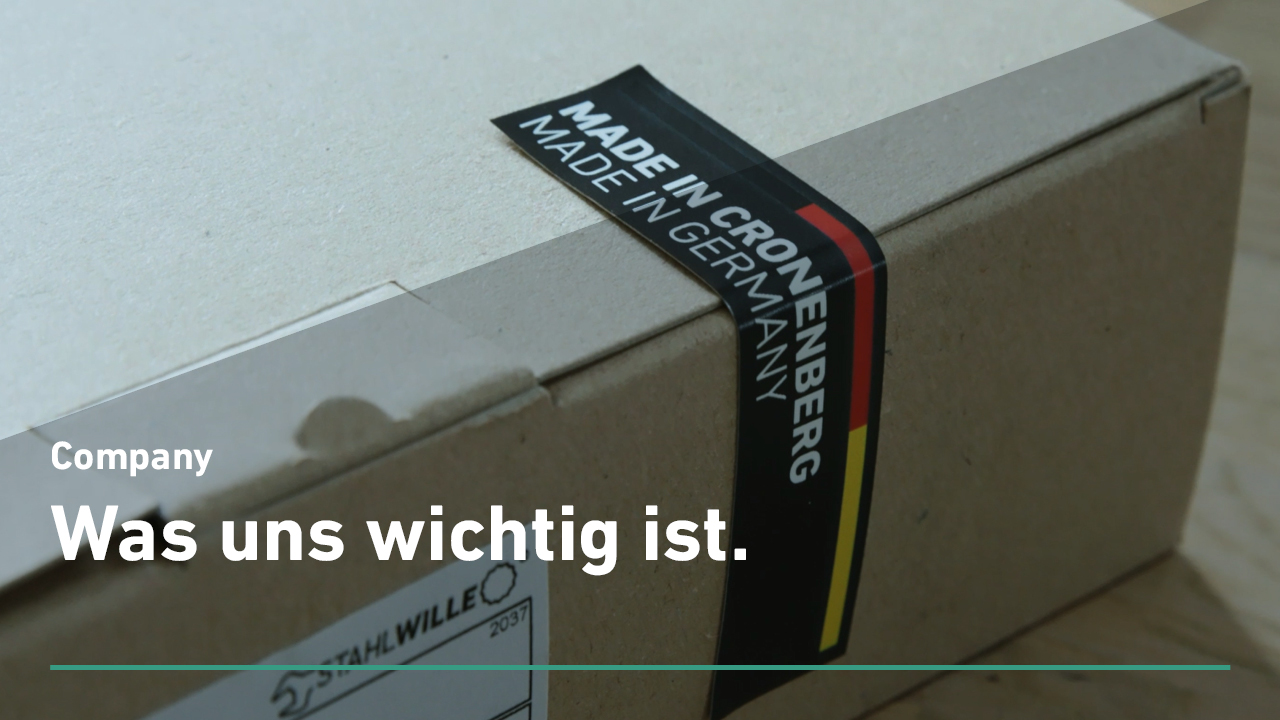Our contribution to more sustainable production.
Local production and quality
Corporate Social Responsibility (CSR) is of great importance to STAHLWILLE. Sustainable and responsible actions are embedded in our DNA, and we are pushing for resource-efficient production. Our durable products, such as ratchets and torque wrenches, are repairable, extending their service life. The commitment to our German location keeps our supply chains short. Through repair, maintenance and calibration, we ensure quality and processes along the entire value chain.
Sustainable packaging solutions
Plastic-free packaging is consistently used for customer shipments. Plastic is completely eliminated wherever possible. Instead, recyclable materials such as solid cardboard, recycled paper and paper-based gummed tape are used. Machines have also been introduced to produce padding strips from recycled paper and the use of plastic strapping tape was reduced by 90%. The vast majority of tool assortments are delivered in TCS inlays in cardboard boxes with paper packing. In accordance with the EU packaging regulation, all national and international labelling and disposal instructions have been implemented.
Reduced energy usage
In 2023, STAHLWILLE achieved energy savings of 525,230 kWh through targeted measures, which corresponds to 5.56% of total energy consumption. The measures include more efficient production processes, LED lighting in the production halls, a new compressed air management system (SAM 4.0) and a new heating control system. As a result, a total of 127,363 kg of CO₂ emissions were avoided, of which 36,831 kg were due to electricity savings and 90,532 kg were due to gas savings.
Sophisticated product development
Our commitment to conserving resources starts with the prototype. We place importance on the longevity of our tools and offer spare parts and repair kits, which in many cases are available beyond the statutory period. We have also been providing spare parts for numerous tools for over 30 years. Ergonomic hand tools promote precise and healthy working. Where possible, we use recyclable materials and aim to use predominantly identical parts in production to reduce the environmental impact of logistics, storage and production provision.
What matters to us.

Our tools, our responsibility.
Certificates
STAHLWILLE guarantees verified optimal quality in all processes through a comprehensive management system: Quality management in accordance with DIN EN ISO 9001:2015, energy management in accordance with DIN EN ISO 50001:2018 with the aim of improving energy efficiency by 2% annually, environmental management in accordance with DIN EN ISO 14001:2015, and calibration laboratory in accordance with DIN EN ISO/IEC 17025:2018. These certifications underline our commitment to the highest standards of quality, energy efficiency and environmental awareness.
Statutory requirements
STAHLWILLE meets all the requirements of the REACH regulation on chemicals regulation and is a specialist company in accordance with the Water Resources Act. By the beginning of 2025, the switch from chromium VI to the less harmful chromium III will be completed. We comply with the RoHS guidelines for hazardous substances in electrical devices, follow the Battery Act (BattG) and comply with the requirements of the Circular Economy and Waste Act (KrW-/AbfG).
Sustainability policy
Our own sustainability policy defines standards for working conditions, ethics and responsible environment management. It includes the obligation to guarantee fair wages, freedom of association, the abolition of child and forced labour, and the rejection of discrimination and corruption. The policy rules out the use of raw materials of questionable origin and defines measures for comprehensive occupational health and safety, as well as accident and incident management. It also aims to continuously improve water and energy conservation and reduce waste.
Code of Conduct
Our Code of Conduct is a commitment to maximum transparency and fairness in cooperation with suppliers and business partners. It defines binding standards for working conditions, ethics and environmental protection and demands consistent compliance with these standards throughout the entire supply chain. The Code of Conduct prohibits child and youth labour, exploitation, coercion, discrimination, price fixing and the use of raw materials from high-risk areas, as well as any illegal activity. It also requires compliance with the Water Resources Act, external audits and the implementation of environmental protection standards.
